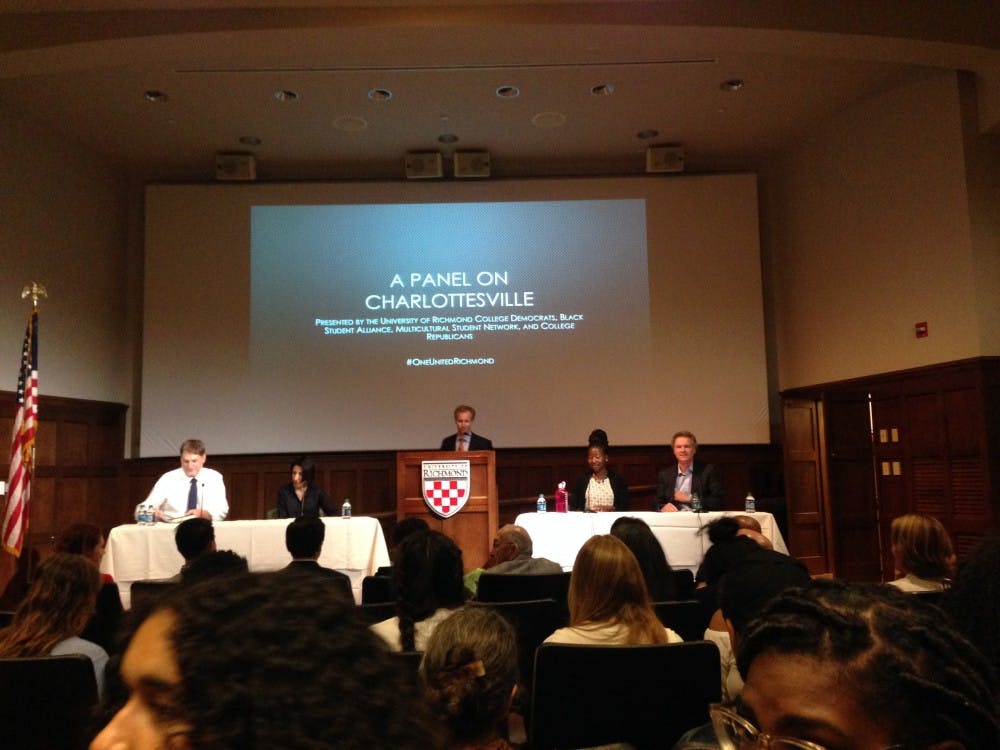On Thursday evening in a packed Ukrop auditorium, University President Ronald A. Crutcher moderated a panel hosted by a coalition of University of Richmond student organizations discussing the recent violence that occurred in Charlottesville, Virginia.
The event brought together panelists from many different areas of campus: Bedelia Richards, associate professor of sociology, Thad Williamson, associate professor of leadership studies, former UR president Edward Ayers, who now serves as Tucker-Boatwright Professor of the Humanities, and Lucia Reinaga from the Latin American, Latino and Iberian Studies department.
UR College Democrats hosted the event in conjunction with the Black Student Alliance, the Multicultural Student Solidarity Network and the College Republicans.
The only moment of open disagreement came when Richards, who is a person of color, said, “protecting free speech is emboldening white supremacy.”
Crutcher, after acknowledging himself as a fellow African-American albeit from a different generation, voiced his support of free speech. All students should engage in conversations about difficult subjects in a proactive and civil way, he said.
"If you don’t agree with someone, you don’t have to sit there and remain silent," Crutcher said. "You can say, 'I don’t agree with you,' and you can do it in a respectful, thoughtful way. The university is a great place for people to learn those skills."
From the start of the panel, dialogue centered on not only the violent events occurring in Charlottesville earlier this month, but also the relevance and implications of these events for the UR community.
“Dare to be a model for how to thoughtfully and seriously engage in the most pressing issues of our time,” Crutcher said in his opening remarks.
Chantel Baker, president of the Black Students Association, prefaced the panel discussion by expressing her expectation for this conversation to continue at the dining hall or while walking to class with peers, a hope echoed by Crutcher and other panelists.
In response to a question posed about fostering open dialogue on race “in groups that need to hear it rather than those who choose to actively engage,” Dr. Richards said students need to “be forced to engage with these issues."
Richards suggested that this could be done through revised freshman orientation programs and curriculum changes that include more diversity training across all departments.
Enjoy what you're reading?
Signup for our newsletter
“It is a mistake to focus only on those who are most resistant,” Richards said.
Regarding Civil War monuments, Ayers spoke not only as a historian of race and the Civil War in the American South, but also as a member of Richmond Mayor Levar Stoney's committee to decide the future of Richmond’s Monument Avenue.
“The people defending [the statues] say they’re good men who fought for what they believed in, but they don’t want to talk about what they were fighting for," Ayers said. "Forget why they fought. Think about the consequences of if they had won."
Alicia Jiggetts, WC’19, who was among the panel's audience, admitted she is still trying to fully understand what happened in Charlottesville, along with how it could have been prevented and what to do in the aftermath.
“My biggest takeaway is that everyone needs to take a stand and have a voice, but we also need to listen to and learn from one another," Jiggetts said. "We have to start embracing other perspectives and see where everyone is coming from so that we can come together for a common purpose and be a united force against white supremacy."
Contact features editor Sara Minnich at sara.minnich@richmond.edu.
Support independent student media
You can make a tax-deductible donation by clicking the button below, which takes you to our secure PayPal account. The page is set up to receive contributions in whatever amount you designate. We look forward to using the money we raise to further our mission of providing honest and accurate information to students, faculty, staff, alumni and others in the general public.
Donate Now



